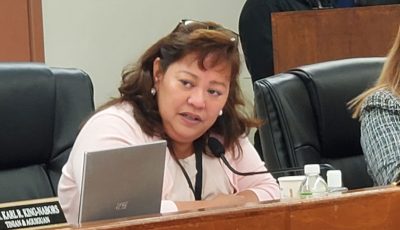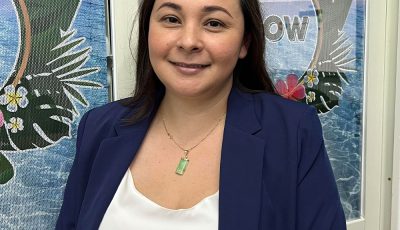AFTER A DIFFICULT 2019
MVA upbeat about arrivals in FY 2020
Torres attends meeting, but left during Q&A
Fiscal year 2019 was a very difficult year for the CNMI in terms of visitor arrivals, but the CNMI’s main tourism body, the Marianas Visitors Authority, is optimistic that tourist numbers will improve in fiscal year 2020. This was the main thrust of the yesterday’s MVA general membership meeting at the Saipan World Resort’s Royal Taga Hall.
At the same time, Gloria C. Cavanagh, who is acting MVA board chair and president of the Hotel Association of the Northern Mariana Islands, warned that, if the CNMI wants the economy to survive, the Commonwealth cannot afford to lose Fiesta Resort & Spa Saipan and its lone international brand, the Hyatt Regency Saipan, whose land leases are set to expire soon.
Gov. Ralph DLG Torres and Lt. Gov. Arnold I. Palacios both attended the meeting and sat on the table with members of the MVA board, but Torres left using the back door of the hall during a question-and-answer portion with an MVA offshore office at 11:30am, shortly after Palacios had also left.
Speaking to MVA members, Cavanagh said that, as was mentioned in MVA’s general membership meeting a year ago, one critical component that has still not been resolved is the matter of public land leases for two of the CNMI’s largest hotels—Fiesta Resort & Spa and Hyatt Regency Saipan.
Cavanagh said they are aware that the Department of Public Lands and the hotels have been talking and MVA strongly urges the CNMI government to “complete negotiations before it is, again, too late.”
Cavanagh said fiscal year 2019 was a very difficult year in terms of visitor arrivals as total arrivals for the year were down 32% to just over 400,000 visitors.
Cavanagh said that regaining the ground lost from Super Typhoon Yutu in October 2018 was a huge task. Just as the CNMI was about to overcome the hurdles created by Yutu—the closure of the Francisco C. Ada/Saipan International Airport, the many months of recovery of flights, and building up the demand from the source markets—that was when the major source markets were hit by softening economies, a trade war between the U.S. and China, and a declining currency exchange rate.
“We all know tourism is a volatile industry, often influenced by national and international factors outside our local control,” she said, citing fiscal year 2019 as a “perfect example” of that.
As a result, Cavanagh said, the MVA took a major hit to its budget last fiscal year. She said MVA had initially budgeted $15.8 million for the year, including about $400,000 for the Department of Finance enforcement of hotel occupancy tax collections from bed and breakfast establishments, guesthouses, and other establishments, leaving $15.4 million for marketing and programs.
Cavanagh said that when Yutu hit, that budget was reduced to $14 million, and then further reduced to less than $12 million, based on actual collection of hotel occupancy tax during the year.
As of today, only 52% of that funding has been received, Cavanagh said. That’s about $6.2 million given to MVA, with $5.7 million in receivables that have yet to be released by the central government.
This budget cut, she said, forced the MVA to reduce its marketing budgets in source markets, causing MVA to cut marketing programs such as consumer and trade shows and cooperative programs with partners.
Furthermore, Cavanagh said, MVA has been forced to close its Russia marketing office, cancel signature events, delay destination enhancement projects, and delay payment to vendors, both local and MVA’s off-short marketing offices.
Cavanagh said looking ahead to fiscal year 2020, although they have lost the Russian parole program and the parole program for Chinese visitors has been reduced to 14 days, things are expected to improve with the commencement of regular, daily direct flights by Skymark Airlines Inc. from Tokyo, Japan, to Saipan beginning Nov. 29, 2019.
She said negotiations to bring back a Japan-based carrier to the Marianas have been in the works for a couple of years and that they were extremely pleased to join with Torres and Skymark president Masahiko Ichie and the Skymark team in making this announcement last month.
If all goes as planned, these flights will bring an estimated 40,000 visitors to the Marianas from Japan this fiscal year, based on an 80% load factor, Cavanagh said.
She said this compares to about 12,000 Japanese visitors received last year.
On MVA’s new fiscal year budget, Cavanagh said they are currently projecting $13.6 million for the year for marketing, programs, operations, and personnel.
“If we receive our hotel occupancy allotments on time on a monthly basis, as required by Public Law 18-1, it will be an improvement over last year,” she said.
The next speaker was MVA’s representative office in Japan, Japan in-country manager Takashi Ichikura.
Cavanagh also discussed briefly MVA’s position about the CNMI Cannabis Act of 2018, as it relates to tourism in the Marianas.
She said under this law and once regulations are promulgated, people will be allowed to use marijuana for medicinal and recreational purposes.
However, she said, as marijuana is still illegal federally, U.S. Customs Border Protection has advised that any visitor who states to CBP that they are entering the Marianas to use marijuana may be denied entry and/or banned re-entry.
Cavanagh said the MVA realizes that marijuana is still considered an illicit drug in many of the CNMI’s source market countries.
“This may cast a shadow on our image as a family destination. We are awaiting the promulgation of regulations,” she said.
Meanwhile, she said, as an agency, MVA does not anticipate undertaking any marketing strategies that may contradict or harm the CNMI’s image in those critical markets.
When asked in a later interview why she is the acting MVA chair, Cavanagh said that board chair Marian Aldan-Pierce has a “family emergency thing.”
On the presentations of MVA’s offshore offices, Cavanagh said she is actually very optimistic, especially after the China presentation, that they have control over how they want to increase the number of tourists coming from China to the CNMI.
“They look like they understand the market, the changes of how to attract a tourist,” she said.
Cavanagh noted that China offshore office created their own emojis for the CNMI. “It sounds like that they are thinking outside the box of what we have done traditionally in the CNMI in trying to bring in [visitors] and promoting and marketing our destination,” she said.
Cavanagh hopes that MVA will be able to be on that track despite its funding issues.
In her closing remarks, MVA managing director Priscilla M. Iakopo said that MVA is excited about the new opportunities before the CNMI in fiscal year 2020, especially with the advent of Skymark Airlines’ direct flights.
In addition to increased arrivals this fiscal year 2020, Iakopo said they are looking forward to several destination projects, including the Flower Islands Project to turn Banzai Cliff into a garden, the Freedom is Nature Trail at Mt. Sabana on Rota, and the Tinian Beach Pathway.
“Together, we will continue to work with you, our valued partners, in rebooting the Marianas tourism economy to benefit our businesses, our government, and our community at large,” she said.
The guest speakers who did the presentation for MVA’s offshore offices were Takashi Ichikura for MVA Japan, Adam Li of MVA China, Steven Cheng of MVA Taiwan, and Seijin Kim of MVA Korea.



























